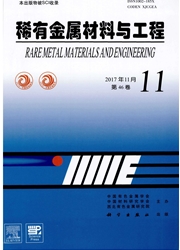

 中文摘要:
中文摘要:
暴露十空气中的钛表面容易受到碳氢化合物的污染,本研究的目的是探讨不同程度的碳氢化合物污染对钛片表面生物活性及对成骨细胞黏附和增殖的影响。将酸蚀处理的钛片分成4组,用常规的保存方法分别储存不同的时间。通过扫描电镜,表面轮廓仪,X射线光电子能谱和接触角测量等手段分析钛片表面理化性能的变化,然后在钛片表面进行细胞培养试验。结果表明,钛片的表面形态不会随着储存时间的改变而改变,但是,钛片表面的化学组成随着储存时间的增加而改变,碳含量从25.99%增加到48.16%。另外,碳氢化合物污染还改变了钛片表面润湿性,从最初的亲水性变成了疏水性。细胞培养结果表明,碳氢化合物的污染不利于成骨细胞的黏附与增殖。凶此,改良钛表面的保存方法以保持其表面活性是以后研究的方向。
 英文摘要:
英文摘要:
The purpose of this study is to investigate the initial cellular responses on acid-etched titanium surface with different de- grees of hydrocarbons contamination in the atmosphere, with reference to cell adhesion and proliferation in vitro. Acid-etched sur- faces were prepared and divided into 4 groups, which were stored in sealed containers for different durations. Scanning electron mi- croscopy, Optical profiler, X-ray photoelectron spectroscopy (XPS) and contact angle measurements were used to examine surface characterization. MG63 osteoblast-like cells were cultured on these discs, and cell attachment and cell proliferation were analyzed. The results of Scanning electron microscope and Optical Profiler analysis show that the titanium discs used in this experiment share the same surface topography; however, X-ray photoelectron spectroscopy (XPS) examination show that the carbon atomic percent- age presented on titanium surface increases with prolonging of storage time, from 25.99% to 48.16%. In addition, the surface changes from being hydrophilic to hydrophobic as the storage time increases. Cell attachment and cell proliferation show better re- suits on the new titanium surface (P〈0.05), and the morphology of cells on the new surface also spread wider and better, compared with all the old surfaces. Hydrocarbons contamination on titanium surface significantly affects the bioactivity of acid-etched surfaces More efforts are needed to improve the storage methods in order to maintain the bioactivity of titanium implant.
 同期刊论文项目
同期刊论文项目
 同项目期刊论文
同项目期刊论文
 期刊信息
期刊信息
